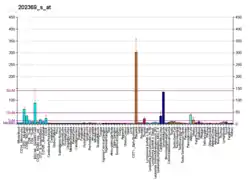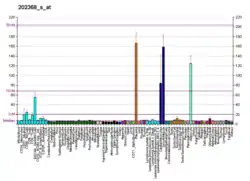TRAM2
Translocating chain-associated membrane protein 2 is a protein that in humans is encoded by the TRAM2 gene.[4][5][6]
| TRAM2 | |||||||||||||||||||||||||
|---|---|---|---|---|---|---|---|---|---|---|---|---|---|---|---|---|---|---|---|---|---|---|---|---|---|
| Identifiers | |||||||||||||||||||||||||
| Aliases | TRAM2, translocation associated membrane protein 2 | ||||||||||||||||||||||||
| External IDs | OMIM: 608485 MGI: 1924817 HomoloGene: 8183 GeneCards: TRAM2 | ||||||||||||||||||||||||
| |||||||||||||||||||||||||
| |||||||||||||||||||||||||
| |||||||||||||||||||||||||
| Orthologs | |||||||||||||||||||||||||
| Species | Human | Mouse | |||||||||||||||||||||||
| Entrez | |||||||||||||||||||||||||
| Ensembl | |||||||||||||||||||||||||
| UniProt | |||||||||||||||||||||||||
| RefSeq (mRNA) | |||||||||||||||||||||||||
| RefSeq (protein) | |||||||||||||||||||||||||
| Location (UCSC) | Chr 6: 52.5 – 52.58 Mb | n/a | |||||||||||||||||||||||
| PubMed search | [2] | [3] | |||||||||||||||||||||||
| Wikidata | |||||||||||||||||||||||||
| |||||||||||||||||||||||||
TRAM2 is a component of the translocon, a gated macromolecular channel that controls the posttranslational processing of nascent secretory and membrane proteins at the endoplasmic reticulum (ER) membrane.[6]
References
- GRCh38: Ensembl release 89: ENSG00000065308 - Ensembl, May 2017
- "Human PubMed Reference:". National Center for Biotechnology Information, U.S. National Library of Medicine.
- "Mouse PubMed Reference:". National Center for Biotechnology Information, U.S. National Library of Medicine.
- Nomura N, Nagase T, Miyajima N, Sazuka T, Tanaka A, Sato S, Seki N, Kawarabayasi Y, Ishikawa K, Tabata S (Dec 1995). "Prediction of the coding sequences of unidentified human genes. II. The coding sequences of 40 new genes (KIAA0041-KIAA0080) deduced by analysis of cDNA clones from human cell line KG-1". DNA Res. 1 (5): 223–9. doi:10.1093/dnares/1.5.223. PMID 7584044.
- Onuchic LF, Mrug M, Lakings AL, Muecher G, Becker J, Zerres K, Avner ED, Dixit M, Somlo S, Germino GG, Guay-Woodford LM (Jan 2000). "Genomic organization of the KIAA0057 gene that encodes a TRAM-like protein and its exclusion as a polycystic kidney and hepatic disease 1 (PKHD1) candidate gene". Mamm Genome. 10 (12): 1175–8. doi:10.1007/s003359901186. PMID 10594243. S2CID 11705244.
- "Entrez Gene: TRAM2 translocation associated membrane protein 2".
Further reading
- Sudo K, Chinen K, Nakamura Y (1995). "2058 expressed sequence tags (ESTs) from a human fetal lung cDNA library". Genomics. 24 (2): 276–9. doi:10.1006/geno.1994.1616. PMID 7698749.
- Hillier LD, Lennon G, Becker M, et al. (1997). "Generation and analysis of 280,000 human expressed sequence tags". Genome Res. 6 (9): 807–28. doi:10.1101/gr.6.9.807. PMID 8889549.
- Strausberg RL, Feingold EA, Grouse LH, et al. (2003). "Generation and initial analysis of more than 15,000 full-length human and mouse cDNA sequences". Proc. Natl. Acad. Sci. U.S.A. 99 (26): 16899–903. doi:10.1073/pnas.242603899. PMC 139241. PMID 12477932.
- Mungall AJ, Palmer SA, Sims SK, et al. (2003). "The DNA sequence and analysis of human chromosome 6". Nature. 425 (6960): 805–11. Bibcode:2003Natur.425..805M. doi:10.1038/nature02055. PMID 14574404.
- Hsu LC, Liu S, Abedinpour F, et al. (2003). "The murine G+C-rich promoter binding protein mGPBP is required for promoter-specific transcription". Mol. Cell. Biol. 23 (23): 8773–85. doi:10.1128/MCB.23.23.8773-8785.2003. PMC 262660. PMID 14612417.
- Stefanovic B, Stefanovic L, Schnabl B, et al. (2004). "TRAM2 protein interacts with endoplasmic reticulum Ca2+ pump Serca2b and is necessary for collagen type I synthesis". Mol. Cell. Biol. 24 (4): 1758–68. doi:10.1128/MCB.24.4.1758-1768.2004. PMC 344171. PMID 14749390.
- Gerhard DS, Wagner L, Feingold EA, et al. (2004). "The status, quality, and expansion of the NIH full-length cDNA project: the Mammalian Gene Collection (MGC)". Genome Res. 14 (10B): 2121–7. doi:10.1101/gr.2596504. PMC 528928. PMID 15489334.
- Kimura K, Wakamatsu A, Suzuki Y, et al. (2006). "Diversification of transcriptional modulation: large-scale identification and characterization of putative alternative promoters of human genes". Genome Res. 16 (1): 55–65. doi:10.1101/gr.4039406. PMC 1356129. PMID 16344560.
This article is issued from Wikipedia. The text is licensed under Creative Commons - Attribution - Sharealike. Additional terms may apply for the media files.



